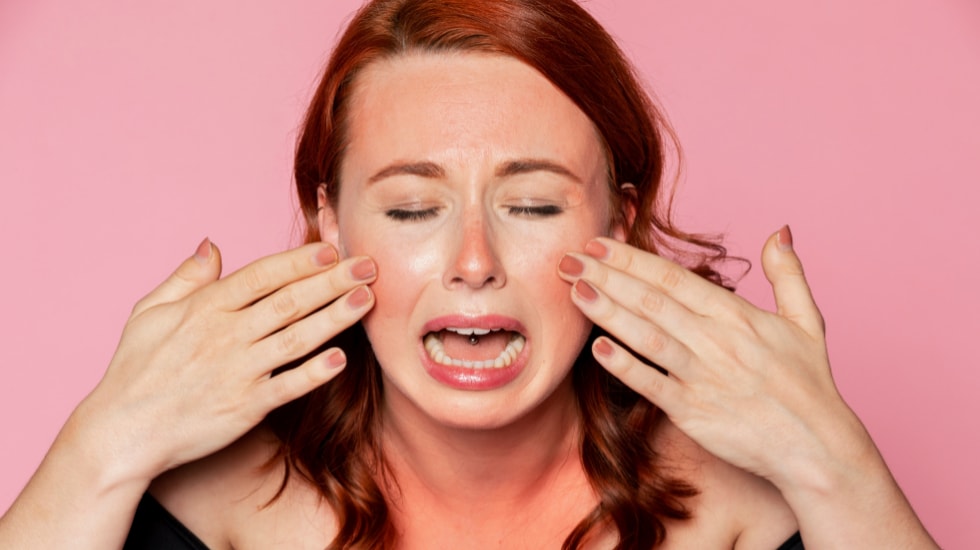EXTERNAL ETIOLOGIES
1. Sun Exposure – In addition to the risk of skin cancer, the sun harms the top layer of skin (epidermis) with each exposure. Researchers estimate that exposure to sunlight’s UVA and UVB rays counts for 90% of the symptoms of skin maturing. Over time, this damage adds up, resulting in fine lines, age spots, and visible redness. Sun exposure causes people to frown or squint against the harsh light, resulting in wrinkles between the eyebrows and around the eyes.
2. Geographical Location – Some climates are better for skin than others. High altitudes or desert environments provide little moisture to be absorbed by the skin and in effect, will draw moisture out of the skin. Over time this results in fine lines and deeper wrinkling effects.
3. Environmental Pollution – Chemicals in the atmosphere can lead to both increased intensity of harming UV light and to poor skin cell health. With airborne pollution, particulate matter collects on the skin. This can induce problems for the skin, including the generation of highly reactive particles called “free radicals.” Pollutants also activate the skin’s protective inflammatory response, eventually impairing the barrier function leading to premature skin aging. Pollution is also linked to increased skin tumors and an alteration of the skin microflora.
4. Stress – Stress is bad for every part of your body, but its harm shows up readily on your skin. Patients routinely tell us that their eczema, dandruff and other conditions flare with stress. Conversely, numerous studies have shown that those who practice meditation, or any other form of deep relaxation, heal faster. Slow, deep, “belly breathing” facilitates the removal of waste through the lymphatic system. Also, the increased circulation of blood promotes cell turnover and encourages the formation of collagen and elastin needed to minimize wrinkles.
INTERNAL ETIOLOGIES
1. Smoking – (of any type) If you smoke or use e-cigarettes, the nicotine narrows the tiny capillaries that bring blood to the surface of the skin, inhibiting the renewal of cells and the removal of toxins. It also releases an enzyme that breaks down the vital collagen and elastin you need to keep your skin looking young. And of course, cigarette smoke itself is full of hundreds of toxins that end up circulating in your bloodstream. Smoking is also well known to inhibit skin wound healing responses.
2. Nutrition – Fats, refined flour, and highly processed foods can all irritate the skin, cause breakouts, as well as break down the elastin and collagen you need to keep your skin looking younger. Try to eat the recommended five fruits and vegetables a day. In addition, Focus on foods like salmon, avocados, walnuts, olive oil, and flaxseeds that are high in omega-3 fatty acids, which not only nourish the skin but serve to plump it up, thus reducing fine lines. A good rule of thumb is to avoid most foods white in color – bread, pasta, sugar, white potatoes. Instead, opt for colorful choices, fruits, and vegetables, found in the periphery of the grocery store.
3. Sugar – Sugar gets its own category because it not only causes as much damage to the cardiovascular system and, consequently, to the skin, as smoking and fatty foods, but also because it causes a process known as glycation which harms collagen, the substance that supports skin and prevents wrinkles. In other words, sugar actually attaches to our collagen, makes it crispy instead of supple, and leads to a dry, cracked, sagging, and aged complexion.
4. Alcohol – Excessive alcohol can dry the skin, acting as a diuretic, pulling water from your body. It can also inflame the skin surface, causing the capillary expansion that confers a ruddy-looking complexion and worsening rosacea. Remember – anything you put into your body will show up on your skin. The only exception to this rule MIGHT be red wine in moderation, due to its antioxidant and resveratrol content. But alcohol is best left for special occasions.
5. Sleep – Inadequate sleep produces excess cortisol, a hormone that hinders the ability of skin cells to renew them. At least seven to eight hours of sleep each night is recommended.
6. Poor Sleeping Positions – The American Academy of Dermatology (AAD) warns that sleeping on your side or stomach every night—as with squinting and frequent frowning— causes permanent wrinkles on your cheeks, chin, and chest. The AAD recommends sleeping on your back if possible, to decrease the pressure that may lead to excessive compression.
7. Lack of Exercise – Exercise does bathe the skin with oxygen-rich blood, facilitating the turnover of old skin cells and promoting the growth of newer cells. In addition, it promotes the circulation of lymphatic fluid, which is the body’s way of removing waste and delivering nutrients. Any type of exercise is good for your skin, even a brisk walk.
8. Poor Cleansing Routine – When it comes to skincare, gentler is generally better. You don’t need harsh scrubs, but you do need to cleanse your skin twice a day to remove the environmental pollutants you are exposed to in everyday life. Harsh exfoliants can strip the skin of its natural moisture. Don’t forget to hydrate the skin after cleansing with an effective Orange Daily Topical Vitamin C cream or lotion to lock in the moisture. Moisturizing alone can work wonders for improving the appearance of fine lines and wrinkles.
Healthy Skin is Beautiful Skin!
Stay tuned – more useful skincare information coming!
Dr. Dave
EVERY DAY! WITHOUT FAIL!
Spirit * Soul * Mind * Body



Trackbacks/Pingbacks